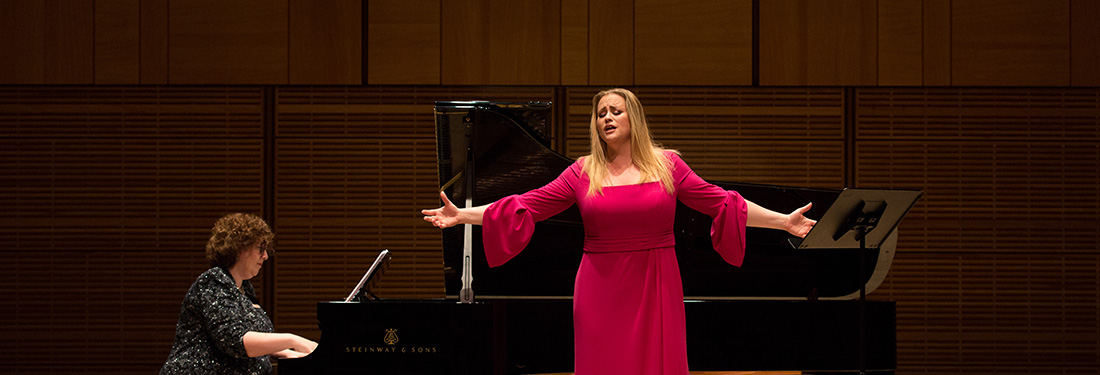
It’s an exaggeration, of course, but since winning Operalia a decade ago, her appearances the Met so far have been restricted to Contessa and Donna Anna. San Francisco opera goers have been luckier – she’s appeared there as Eva and Rusalka, and Chicago got her first Don Carlos (in French!) this season.
Meanwhile, her repertoire in Europe is far more varied: a much-discussed Vêpres Siciliennes in Munich in 2018 revealed surprisingly fluid coloratura and an excellent trill from such a rich voice, and she’s been cast in everything from Alcina to Leonore to Ellen Orford to Rosalinde. But the American houses seem to have finally picked up on her potential in a wider range of roles, and this year sings the Marschallin in Santa Fe, Violetta in LA, and Trovatore at the Met – a worthy homecoming.
This season also marks Willis-Sørensen’s Carnegie Hall debut, not as part of Carnegie’s mainstage series but rather in a recital presented by The Center for Latter-Day Saint Arts. The raison d’être for the recital was the premiere of a new song cycle, composed for Willis-Sørensen by S. Andrew Lloyd as the winner of an annual composition competition in honour of Met Opera stalwart Ariel Bybee.
Titled Amaranthine, the five-movement cycle fluctuates between a film-score romanticism that allows Willis-Sørensen and pianist Tamar Sanikidze plenty of opportunity to soar and a gauzy, lightly atonal sound world. The most interesting part of the cycle is in the melismatic plainsong of the third movement, sung a cappella and reminiscent of Gregorian chant. If Lloyd’s music is attractive without being revelatory he’s undeniably skilled at writing for the voice, allowing ample opportunity for Willis-Sørensen to indulge in long, soaring lines and floated high notes.
The program started with Amy Beach’s Three Browning Songs, sung with rapturous tone and earnest disposition. A set of Rachmaninov romances found her on less familiar territory – a charmingly unfiltered stage personality, Willis-Sørensen commented to the audience that she found singing in Russian particularly challenging, and let out a sigh of relief after the wordy “Krysolov”. She sounded happiest in the long lines of “Son” and in the Valkyrian cries of “Au”, sounding uncomfortable with the delicate shifting harmonies of the first three songs.
She was on far finer form in a set of Sibelius songs, with possibly the best performance of these songs I’ve heard. Willis-Sørensen possesses both the delicacy needed for “Lasse liten” and sheer power for the slow-burn intensity of “Flickan kom ifrån sin älsklings mote.” It’s clearly a voice at its best in passionate outburst, and the yearning long lines of “Den första kyssen” and “Var det en dröm” were thrilling. She also revealed a potent lower register in the final two songs, plunging into a rich chest voice.
It was the final set of Strauss songs, though, that revealed just what that voice can do. While “Zueignung” and “Cäcilie” were appropriately rapturous, sailing above Sanikidze’s vigorous playing, “Morgen!” and “Allerseelen” showed just how intelligently Willis-Sørensen can shade the text and music and bring something new to songs we’ve all heard a million times before. But it was the much-rarer “Frühlingsfeier” that impressed me the most, its wild, tumultuous lines and erotically charged cries to Adonis making me long to hear her take on the same composer’s Danae or Helena.
The day before, I had the opportunity to have a fabulously unfiltered chat with Willis-Sørensen about her career, fach, and American pedagogy. We held the interview on the day of the solar eclipse, and the interview concluded, somewhat surreally, with the experience of her, wearing eclipse glasses, singing Rusalka’s Song to the Moon atop a Times Square rooftop.
I remember hearing you win Operalia a decade ago, singing “Dich teure Halle” – and here you are singing Violetta. How did that come about?
It was a coincidence of timing more than anything. There was a gap in the jugendlich dramatischer fach just when I was starting my career, and for my management it was a no-brainer to promote me that way. I speak German, and I’m also tall and blonde, so I think everyone was like “well, there’s a Valkyrie right there!”
Is that a difficult expectation to live up to as a young emerging singer?
I had been mostly singing Mozart, and then suddenly and quickly I was accelerating into this Wagnerianrepertoire. People were offering me Sieglinde and Senta and I had my trepidations, but my management was like, “at least you got a job!” That’s a difficult position to be in as a young singer – that’s not the vibe you want in the room when you’re discussing career plans, but it’s also difficult to get out of.
So what changed?
I was singing the more lyrical Wagner roles: Elsa, Elisabeth, and Eva and even then, I noticed that I had the most lyrical voice in the cast by a wide margin. I love singing Wagner and I love what it does harmonically, but I think that the glory of the voice isn’t really in that repertoire. The other thing is that I’d heard in some other singers this sort of, I don’t know, Teutonic presentation of their instrument which doesn’t align with my technical preference. I didn’t necessarily consider it a compliment to be told that I should only be singing German repertoire. I always really wanted to sing Verdi, and I remember my management saying to me, “look, I just don’t think that’s your path – maybe someone eventually will let you sing Verdi as a compliment to your ego, but it’s never going to be your thing.”
You started your career, as many singers do, with Mozart.
It’s strange, isn’t it – people saw me singing those Italian roles and thought Strauss and Wagner. I was singing things like Fiordiligi, with lots of coloratura, long secco recits which require a very strong command of Italian. I kept pushing my management for more Italian repertoire, and eventually I switched management because my new manager told me he could hear that potential in me. That started me off on a whole new path singing lots of Verdi, but I haven’t abandoned any of that old repertoire. I’m still singing Donna Anna, a bunch of Strauss roles, and I keep the lyrical Wagner roles in my repertoire as well.
Do you have to plan your seasons carefully, given the various requirements of these roles?
So, I just premiered Traviata in Los Angeles this weekend, and I just flew in from Hong Kong where I did my first Ariadne. While I was rehearsing, I thought to myself, “has anyone ever done Violetta and Ariadne within a month? This is so stupid, what am I doing?” But actually, I think they’ve helped each other. Ariadne brought in a lyricism and breath support for long phrases that have improved how I sing Violetta. It all feeds itself, and I think this diversity helps keep the voice flexible and long-lasting.
Do you feel confined by fach?
I like to say that my fach is non-fach – I just sing whatever I can get my throat around. If you asked me what my two favourite roles are, I’d say Violetta and Rusalka. Different fachs, one could argue, but I sing them with my voice and I’m happy with how I present those two roles. I admire singers like Renée Fleming who just sings whatever she wants to sing. That’s sort of my goal: how can I confuse people?
There’s being able to get your voice around the notes of all of these roles, and then there’s style. Is it scary to sing, say, Rosenkavalier or Fledermaus in Vienna, and then Trovatore in Italy?
Well, thank you for bringing that up, because that’s something I think about a lot and work very hard on! I think there’s this prevailing notion that one can only do one style well and I’m trying to fly in the face of that, and then sometimes I think that I’m a fraud and can’t do any style well! I think where it comes from is cultivating your own taste and aesthetic from listening. I listen a lot to historical recordings, my colleagues, conductors – for instance, whenever I do a Verdi role, I listen to Callas to study her technical and musical and dramatic choices to see how those would fit with my approach.
I also think we talk about style as if it’s this concrete thing – tastes also evolve with time, and each conductor will have their own choices. In Verdi, for example, some conductors are very come scritto, others prefer lots of rubati and portamenti. There’s this fear sometimes, especially in America, of portamenti, which is funny since it’s stylistically correct and healthy for the voice. So, I have to balance being uncompromising to my voice and my taste, but also flexible enough to fit in with a conductor’s musical vision and also to keep learning.
Let’s talk a bit about American training. There’s this idea that American singers need to have perfect technique and language skills…
Sorry to interrupt, but this is absolutely one of the topics I’m passionate about. Maybe this is heretical, but in America I think we sometimes focus on the wrong things. We focus so much on pronunciation – it’s important, of course, to try and sound native to remove as much artifice as possible. But it’s so much more important to work on the meaning of the text! When Javier Bardem does English movies, does his accent detract from his artistry? But for some reason, in the American operatic training system, we act like pronunciation is the most important thing.
Why do you think that is?
Maybe it’s easier! You just have to hire a native speaker to tell students how to roll their R’s. But for me, you need to be able to say something, not just to sing a role. And every time you say something you need a subtext – if you don’t consciously control that narrative, your subtext might accidentally be “I sound amazing!” and that’s boring. I have sat through many an impressive technical performance where the singer came across as just thinking about how great they sound, and it’s boring! The real point of performing is the connection you can forge between yourself and everyone else in the room, and being able to communicate is the difference between acceptable art and great art.
You were part of the ensemble at the Semperoper Dresden for three years. How do you think the fest system changed how you view fach?
Well, Dresden is a big house with a big ensemble – it’s not the kind of theatre where they say “tonight you sing Brünnhilde, tomorrow you sing Queen of the Night!” So, I mostly sang Mozart there, and some operetta which was fun. What I learned most from that experience was how casually people took it. It’s publicly subsidized, so they’re not as desperate to court public favour. If they’ve paid for a production they’ll remount it very quickly and you just jump in and do it. It’s not without its stresses, of course – I had my role debut as Vitellia with three days of rehearsal, pregnant with a cold and jetlag. I remember the set was in such a way that you had to enter through the auditorium doors, and on my first night I discovered it was locked! I was running around looking for a key so I could go onstage to do “Non più di fiori.” It should have been a complete disaster, but it wasn’t. I just did it, and then I realized that all those external conditions that we love to stress out about simply don’t matter. I’m not going to say it was the best performance of my life, but it helped me take the pressure off all the rest of my performances.
How does that compare with the American operatic system?
In Europe, there’s not this idea that if something isn’t absolutely perfect, that we’ll all die. In America, the pressure is so high and I find it destructive in a way. If you put so much pressure on the art, it has to sort of strangle itself out. And I see this a lot in young singers – we all have this panicked desperation not to be replaced by the next young singer. It’s so much the mindset here and also in England, and it’s completely manufactured! The first time I was invited to do a role at the Met, it was like, “do you want to be the 43rd cover? If 42 others get kneecapped in the parking lot, then you’ll have your moment!”, you know? I can’t believe I had the guts to turn them down, but when I came back a few seasons later as the Countess in Figaro that was crucial in how I view myself and my career. I didn’t want to be in this racket, trying to claw my way up through all these people. It’s totally artificial, and I think it helps no one.
So tomorrow you’re making your Carnegie Hall debut, including a world premiere.
I know, right? A world premiere! I’ve never done one before, so I had no idea how it would go. What was interesting was being involved in the whole process from the beginning – I was on the jury selecting the composers, and being able to pick the aesthetic that appealed to me the most was fascinating. I surprised myself, I think, because I love direct, tonal music and I thought I would pick the most Broadway-sounding composer. But Lloyd’s music spoke to me and also presented a challenge.
In what way?
It was interesting not to have any reference material. The first two songs are harmonically quite complex, and the third song is in plainsong, with no metre and completely a cappella. It’s a tough nut to crack, but as I sing it, I also want the audience to be completely unaware of that. I want the audience not to be aware of all of the challenges that stood between me and getting this score into my brain and my vocal chords. But I’m so proud to be the first person to do this, and I don’t know what life this cycle will have in the future but right now I’m so excited to share it with the world.
Is it more pressure to do a world premiere than, say, Traviata?
I was talking to James Conlon right before our opening night of Traviata, and he was giving me all of these notes. He’s very picky, and there were a lot of notes! I had this moment of panic where I just thought, “what if I can’t do all of this?” and then I pulled myself together and told him, “don’t worry, I’ll manage, it’ll be great”. And he looked me in the eye and said, with so much wisdom, “it doesn’t have to be great, it just has to be fine.” And that took the pressure completely off! It’s in that relaxation and self-acceptance that allows you to, sometimes, stumble upon greatness.
Photos: Rebecca Reed, Cory Weaver (LA Opera), Katherine Ashmore (Royal Opera House)
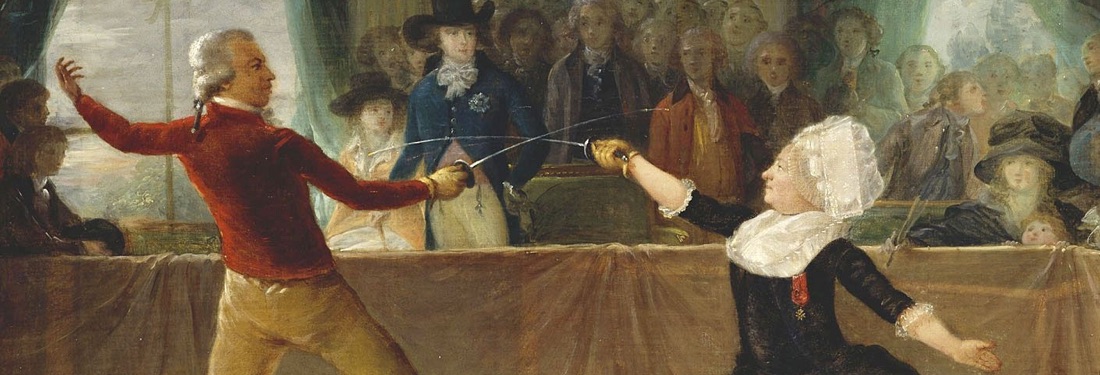
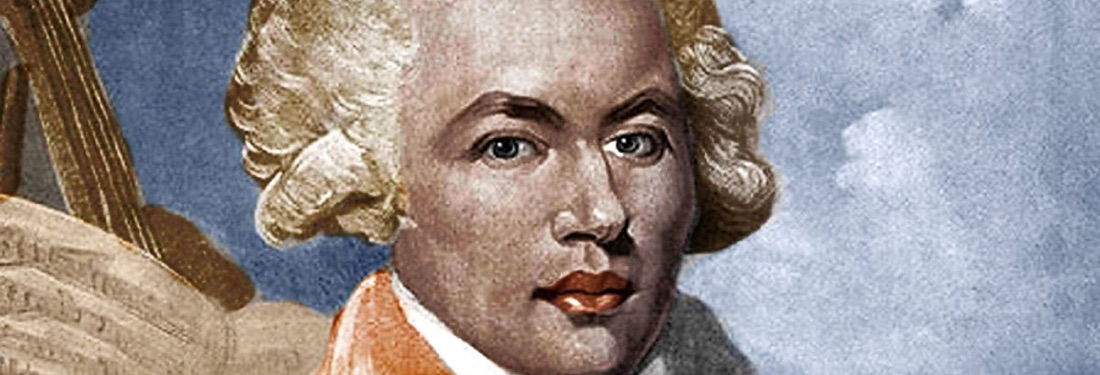
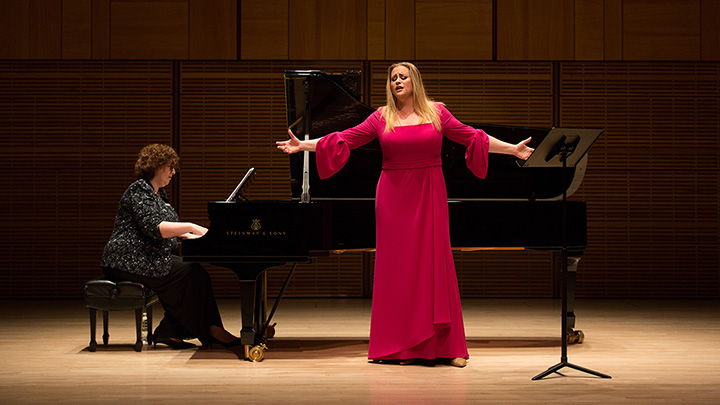
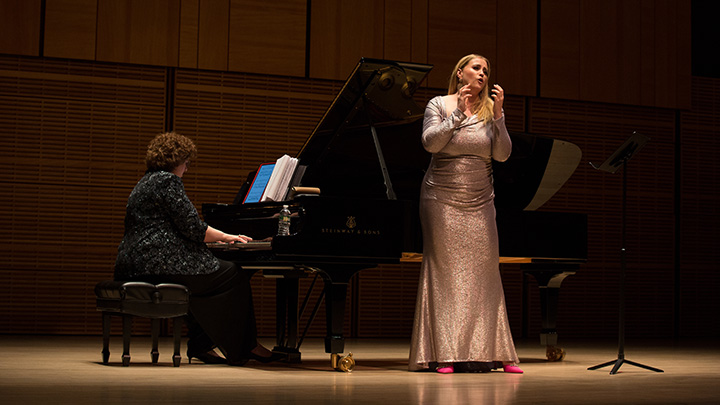
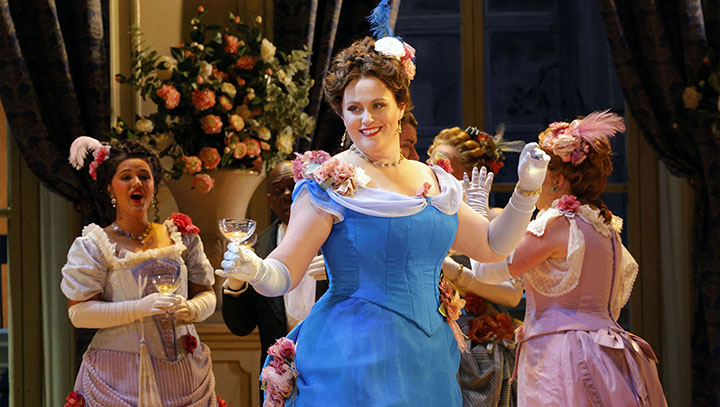
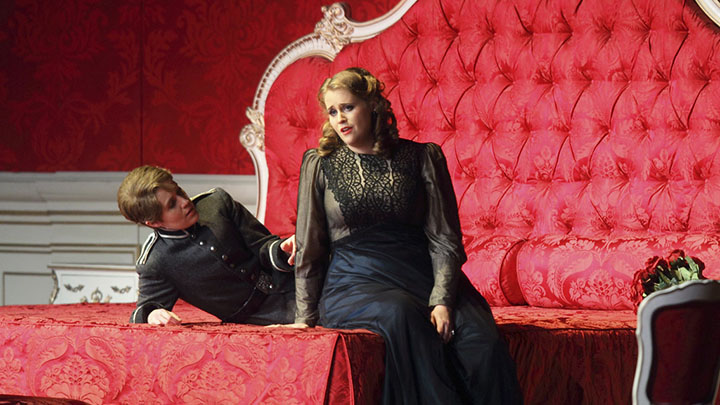
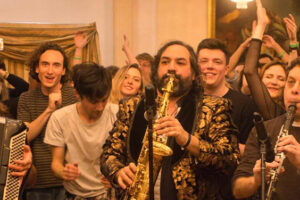
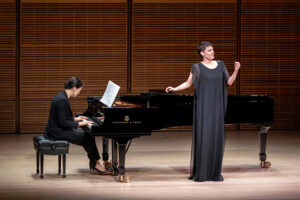

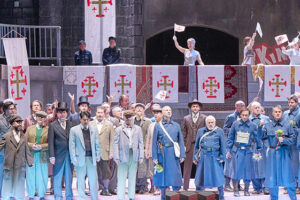



Comments